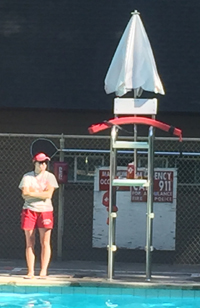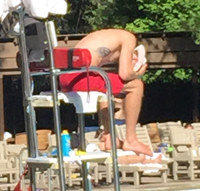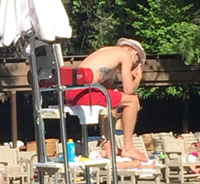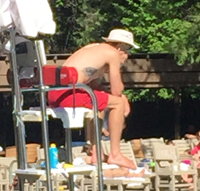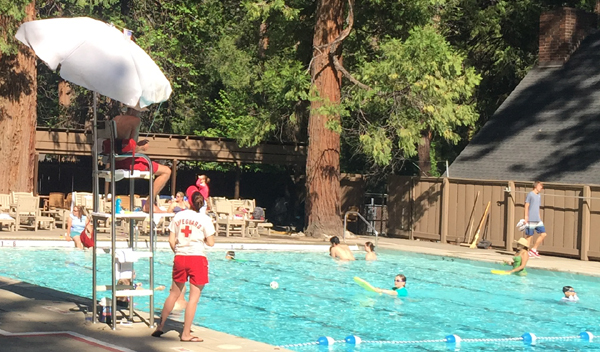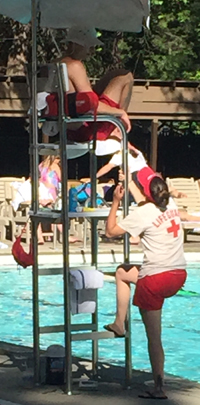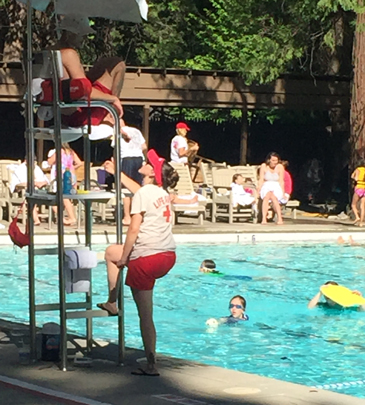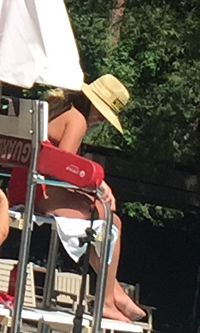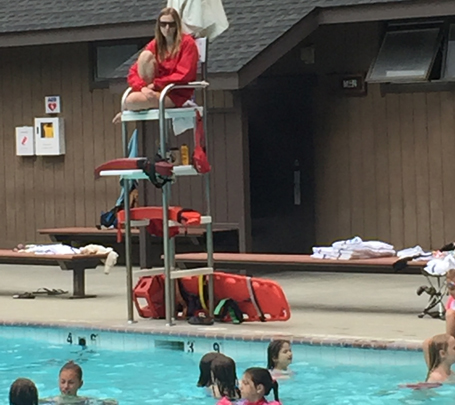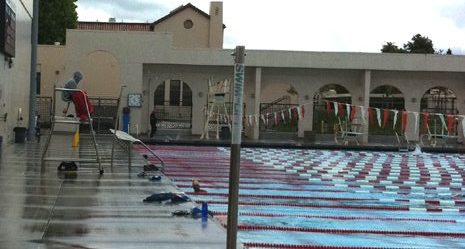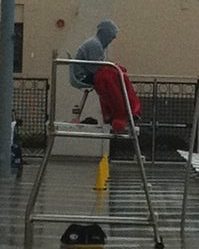This page is a collection of real, not posed, photos of lifeguards on duty who were not ready to do a rescue,
(also known as not whistle worthy)
and equipment/facilities also not rescue ready, for discussion in my lifeguard training and lifeguard instructor classes.
The lifeguards-not-ready-photos start after this info about proper patron surveillance, and how to trade stations:
From the copyrighted 2016, released 2017 American Red Cross Lifeguard Manual (and from previous lifeguard training manuals):
“When performing patron surveillance,
always keep the rescue tube ready to use immediately.
Keep the strap of the rescue tube over the shoulder and neck.
Hold the rescue tube across your thighs when sitting in a lifeguard chair or across your stomach when standing.
Hold the excess line to keep it from getting caught in the chair or other equipment when you move or start a rescue.”
When trading places/stations
(rotating from one lifeguard stand to a different stand
or bringing in a new lifeguard when one on duty goes on a break),
patron surveillance must always be maintained.
The first photo below shows a guard on duty and the replacement guard standing by the lifeguard stand. The replacement guard takes over watching the pool while the guard at the station climbs down from the stand, then starts scanning the pool again. The second guard can then get into position on the lifeguard stand and take over scanning. The guards can exchange any important information, such as to point out a swimmer who needs to be watched more closely.
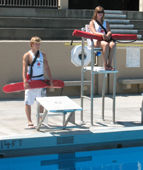
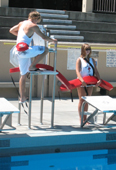
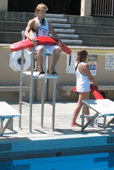
_________________________________
_____________________________________________________________
_________________________________
These photos were shot at a hotel in a national park in 2010. When the lifeguard came on duty (the only guard on duty) there were two people swimming laps. When she got out a book and started reading one swimmer got out of the pool to take the picture.

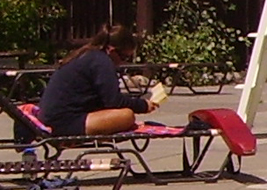
_____________________________________________________________
A lifeguard at a national park pool using her rescue tube as a footrest
instead of having it in her lap, ready for use,
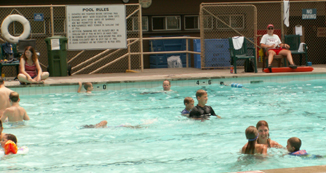
As I watched this pool briefly I saw two other guards demonstrate that they were bored:
one was twirling his whistle,
and another absentmindedly tapped her rescue tube in her lap as if it were a bongo drum.
When some of these guards rotated and changed positions they did not make certain that the pool zone was being watched by at least one of them the whole time.
_________________________________
This photo was taken at the same swimming pool at a National park hotel. There were only a few people swimming that morning.
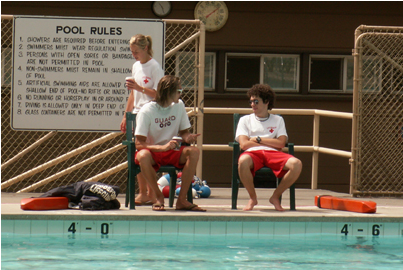
_________________________________
Years later, when I watched this same National Park hotel swimming pool in June 2017, for over fifteen minutes, one man and two women in lifeguard t-shirts and/or red shorts were at the pool. One woman, in a lifeguard t-shirt, shown only in the background in one of these photographs, was arranging chairs along the deck and looked at the pool only rarely.
A second woman was initially standing on one side of the deck,
with her rescue tube up on the lifeguard stand, instead of on her person.
A man was sitting in the lifeguard stand on the opposite side of the deck,
using his rescue tube as a backrest.
In the pictures below you can see the strap of his tube wrapped around the tube,
instead of having the strap around his neck, across his body and the tube in his lap, ready to use, as he was trained to do.
A bit later the woman standing on the deck left her rescue tube on the stand and walked around the pool to the other side of the deck and talked to the male lifeguard for almost ten minutes (with neither of them watching the pool some of the time).
___________________________________________________
Same National Park hotel swimming pool, different lifeguard using her rescue tube as a backrest, June 2018 (one year later)
___________________________________________________
At the same national park swimming pool, years later (2022), we watched a guard with his rescue tube strap around his neck, (instead of over his shoulder and across his torso) applying sunscreen while on duty. When some of the guards rotated and changed positions they did not make certain that the pool zone was being watched by at least one of them the whole time.
Later we saw another guard on duty, talking at length to a person in the pool, in the water below her, about a great hike she had taken. The guard did not seem scan the pool area while she was conversing, (she faced directly towards the person she was talking to and her head did not move back and forth at all).
Another day, another guard, the only one on duty at the time, turned his head away from the pool repeatedly to talk to a woman lying on a lounge behind him:
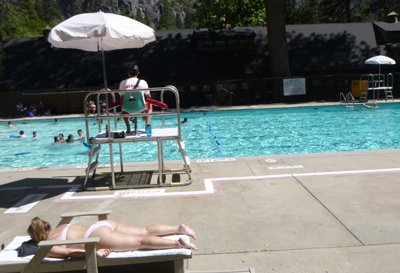
_________________________________
In all cases perhaps the guards
were overconfident about the swimming skill of the pool patrons?
People have drowned at pools where there were lifeguards on duty.
One of the main reasons is inattention to actually guarding the pool full time.
In American Red Cross Lifeguarding we read:
“Drowning and injuries can happen in an instant”
and
“Distractions … affect patron surveillance: for example, a lifeguard talking with other lifeguards or friends. A brief conversation might seem innocent, but during that time you could miss the 20 to 60 second struggle of a young child. The child could die because you were distracted.
You should not engage in social conversations while you are on duty.”
The YMCA Lifeguard Manual says:
“Avoid socializing while on duty.
Scan your area at all times.”
_________________________________
And at a different national park swimming pool, May 2018, a lifeguard with two rescue tubes below her on the lifeguard stand, neither of them with the strap across her shoulders, not instantly ready if something happened at this crowded pool:
___________________________________________________
On the left below, at a California State University, a lifeguard on duty with her feet on her rescue tube.
My students tell me they have seen guards at this facility
with their feet on their rescue tube
AND talking on a cell phone, AND eating lunch,
at the same time.
To the right below, a lifeguard at a California Bay Area private university, with their feet on their rescue tube,
instead of having the tube ready to go in their arms.
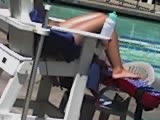
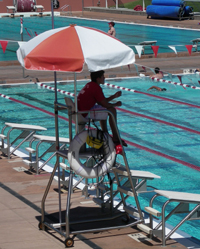
The lifeguards at these two facilities are often on duty alone
and responsible for an entire Olympic sized pool,
about 25 yards by 50 meters.
There is no position you can guard from at that size of pool
that allows you to see the entire surface and bottom of the pool.
___________________________________________________
The person who took the next photos (a lifeguard) was attending classes held in the pool.
This lifeguard on duty at a University of California campus is sitting far up in the pool side bleachers
and can’t see the whole pool bottom.
He would not be able to get to the water quickly to do a rescue,
and would seem to have his eyes on something in his lap rather than on the water (see the closeup in the second photo).
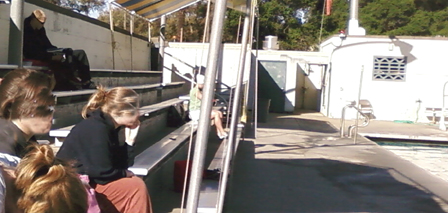

In this last photo we can see that the lifeguard is sitting on his rescue tube:

_____________________________________________________________
At a private club in Santa Clara County, California, July 2009,
the person who took these photos (a lifeguard) was visiting the pool as a patron.
He reported watching as guards on duty chatted with friends and played catch with a football:
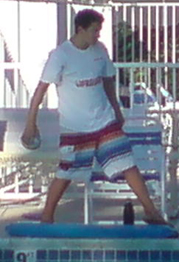
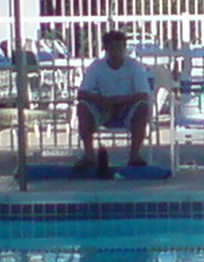
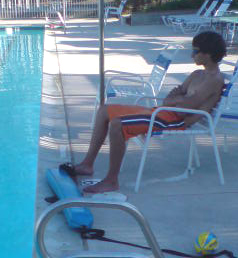
_____________________________________________________________
A relative of one of my lifeguard training graduates sent this photo
of a guard on duty at a Las Vegas hotel:
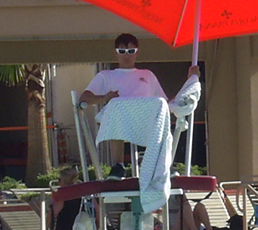
_________________________________
This photo of a lifeguard at a high school was taken on an iphone, so it was difficult to enlarge the close-up, but the end of the red rescue tube is visible under the guard’s jacket he has draped over his legs on a cold morning, June 2011.
_____________________________________________________________
Ken Mignosa took this Saturday, July 22, 2006 at the JSSL (Junipero Serra Swim League) Championships his son was competing in.
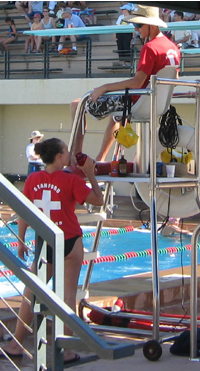
_________________________________
Below a picture of a pool office with a big corner window that would allow the manager to watch the guards/patrons/lessons, except that it has so many flyers posted in the windows, and a big display just outside, that the view is blocked.

_________________________________________________
How long do you suppose this backboard has been sitting out in the sun unused at a local private swim school for the velcro to warp and this many cobwebs to form? How long since they did any in-service training (practice) with it? Where do you suppose the head immobilizer is?
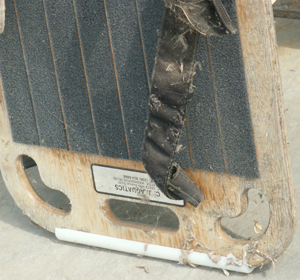
_________________________________
Lifeguards need to guard from lifeguard stands or the edge of the deck
where they can see the whole surface and the entire bottom of the area they are responsible for.
Here’s a job offer on Craigslist:
“Certified Lifeguard at Private Club
Date: 2006-11-27, 1:50PM
XYZ Tennis & Swim Club is looking for a CPR, first aid and water safety certified lifeguard for hours at the xyz Rec pool in Xyz Valley. Hours are flexible, however we are primarily looking for morning (approximately 7 – 9am) or evening hours (6 – 8pm). There may be a need for some mid-day and weekend hours as well if you are interested.
Duties include opening and closing the pool, signing-in and supervising recreational lap swimmers, covering the pool at night, testing the pool chemicals at least once during a shift, and some light maintenance.
The pool is located in a quiet rural area, and there are usually no more than 4 – 5 lap swimmers in the pool at a time.
There is also a large pool office from which the pool can be monitored during bad weather. ”
and see preventative lifeguarding
Should lifeguards wear cowboy boots?
——————————————————————-
The author of this webpage, (written as a homework reading assignment for my students), does not give any warranty, expressed or implied, nor assume any legal liability or responsibility for the accuracy, completeness, or usefulness of any information, product, or process included in this website or at websites linked to or from it. Users of information from this website assume all liability arising from such use.
